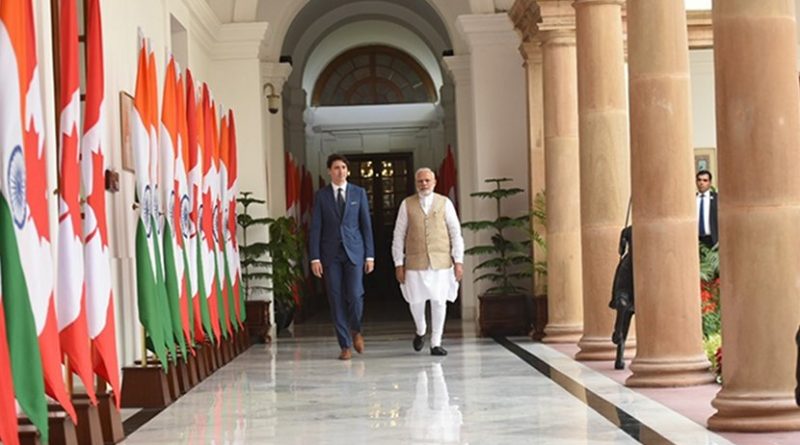India-Canada Energy Cooperation – OpEd
Canada has been one of the biggest success stories in oil over the past few years. India should consider financial investments in Canadian energy assets as a means to secure its energy supplies.
By Amit Bhandari*
By Amit Bhandari*
July 11, 2020 Gateway House

India's Prime Minister, Shri Narendra Modi with the Prime Minister of Canada, Mr. Justin Trudeau, at Hyderabad House, in New Delhi . Photo Credit: India PM Office.
By Gateway House
India is now the world’s third largest consumer of petroleum, and is expected to be a major driver for growth in global oil demand from 2020 to 2040. In 2019, India imported 4 million barrels per day (1.4 billion barrels per year), and this is projected to increase to 9 million barrels per day by 2040, as the country’s economy expands. Canada has the world’s third largest reserves of petroleum in the form of oil sands, and it is also the third largest exporter of oil worldwide. Canada’s oil production is expected to increase from 5.2 million barrels per day to 6.3 million barrels per day by 2030.
Is there an India-Canada oil match to be made?
It could be promising, if Indian companies and investors can be brought into Canada’s vibrant oil producing entities. India’s dominant state-owned oil companies can take minority stakes – purely financial – in Canada’s top oil producers. The investments can be made via a special purpose vehicle, with a mandate to make financial investments, rather than take direct stakes in those companies. The returns will move in line with oil prices, insulating India against fluctuations in the market, especially in higher prices, of oil.
A financial investment will also shelter Indian investors from the political and technical complexities of Canadian oil sands, and will not run foul of Canadian law on acquisitions by foreign state-owned enterprises. Over the longer term, Indian retail investors can be brought in via exchange-traded funds listed in India, which hold shares in major Canadian oil companies. This will bring stability to the market and deepen the bilateral.
How can this work for both sides? For India, investment in overseas oil and gas assets are one way to bring down the risk of high energy prices and disruptions due to geopolitical factors. Canada is among the most stable geographies across the world and is ideally placed to be a hedge against such risks.
For Canada, the big issue has been getting a fair price for its oil – Canadian oil trades at significant discount to common benchmarks due to lack of market access and a limited number of buyers. Getting investors and consumers from a growing market such as India into the upstream sector will also give Canadian companies a source of capital – a major competitive advantage in a world with surplus oil.
*About the author: Amit Bhandari is Fellow, Energy & Environment Studies Programme, Gateway House.
Source: This article was written for Gateway House: Indian Council on Global Relations.
Home » India-Canada Energy Cooperation – OpEd

Gateway House
Gateway House: Indian Council on Global Relations is a foreign policy think-tank established in 2009, to engage India’s leading corporations and individuals in debate and scholarship on India’s foreign policy and its role in global affairs. Gateway House’s studies programme will be at the heart of the institute’s scholarship, with original research by global and local scholars in Geo-economics, Geopolitics, Foreign Policy analysis, Bilateral relations, Democracy and nation-building, National security, ethnic conflict and terrorism, Science, technology and innovation, and Energy and Environment.

India's Prime Minister, Shri Narendra Modi with the Prime Minister of Canada, Mr. Justin Trudeau, at Hyderabad House, in New Delhi . Photo Credit: India PM Office.
By Gateway House
India is now the world’s third largest consumer of petroleum, and is expected to be a major driver for growth in global oil demand from 2020 to 2040. In 2019, India imported 4 million barrels per day (1.4 billion barrels per year), and this is projected to increase to 9 million barrels per day by 2040, as the country’s economy expands. Canada has the world’s third largest reserves of petroleum in the form of oil sands, and it is also the third largest exporter of oil worldwide. Canada’s oil production is expected to increase from 5.2 million barrels per day to 6.3 million barrels per day by 2030.
Is there an India-Canada oil match to be made?
It could be promising, if Indian companies and investors can be brought into Canada’s vibrant oil producing entities. India’s dominant state-owned oil companies can take minority stakes – purely financial – in Canada’s top oil producers. The investments can be made via a special purpose vehicle, with a mandate to make financial investments, rather than take direct stakes in those companies. The returns will move in line with oil prices, insulating India against fluctuations in the market, especially in higher prices, of oil.
A financial investment will also shelter Indian investors from the political and technical complexities of Canadian oil sands, and will not run foul of Canadian law on acquisitions by foreign state-owned enterprises. Over the longer term, Indian retail investors can be brought in via exchange-traded funds listed in India, which hold shares in major Canadian oil companies. This will bring stability to the market and deepen the bilateral.
How can this work for both sides? For India, investment in overseas oil and gas assets are one way to bring down the risk of high energy prices and disruptions due to geopolitical factors. Canada is among the most stable geographies across the world and is ideally placed to be a hedge against such risks.
For Canada, the big issue has been getting a fair price for its oil – Canadian oil trades at significant discount to common benchmarks due to lack of market access and a limited number of buyers. Getting investors and consumers from a growing market such as India into the upstream sector will also give Canadian companies a source of capital – a major competitive advantage in a world with surplus oil.
*About the author: Amit Bhandari is Fellow, Energy & Environment Studies Programme, Gateway House.
Source: This article was written for Gateway House: Indian Council on Global Relations.
Home » India-Canada Energy Cooperation – OpEd

Gateway House
Gateway House: Indian Council on Global Relations is a foreign policy think-tank established in 2009, to engage India’s leading corporations and individuals in debate and scholarship on India’s foreign policy and its role in global affairs. Gateway House’s studies programme will be at the heart of the institute’s scholarship, with original research by global and local scholars in Geo-economics, Geopolitics, Foreign Policy analysis, Bilateral relations, Democracy and nation-building, National security, ethnic conflict and terrorism, Science, technology and innovation, and Energy and Environment.
No comments:
Post a Comment